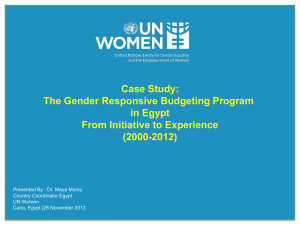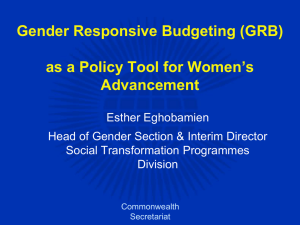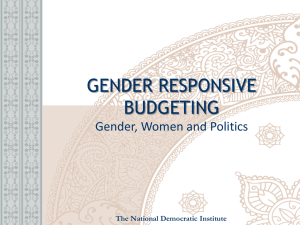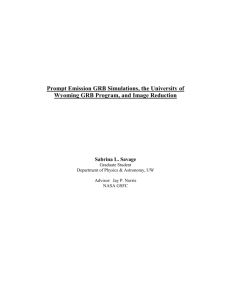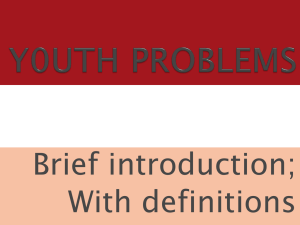Developing capacity of public institutions to formulate gender
advertisement
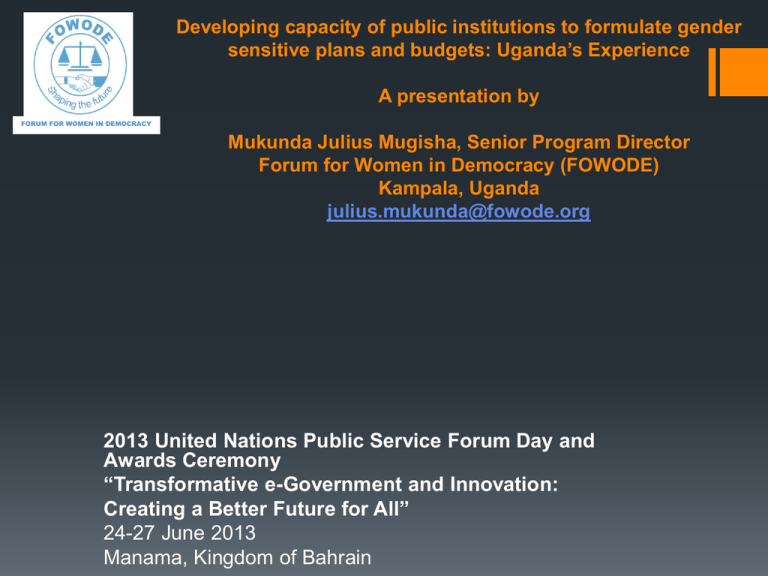
Developing capacity of public institutions to formulate gender sensitive plans and budgets: Uganda’s Experience A presentation by FORUM FOR WOMEN IN DEMOCRACY Mukunda Julius Mugisha, Senior Program Director Forum for Women in Democracy (FOWODE) Kampala, Uganda julius.mukunda@fowode.org 2013 United Nations Public Service Forum Day and Awards Ceremony “Transformative e-Government and Innovation: Creating a Better Future for All” 24-27 June 2013 Manama, Kingdom of Bahrain Background GRB started in Uganda in 1999 But gained momentum in 2004 with increased numbers of technocrats trained in GRB Background In 2006/07 government came on board with the introduction of Budget Call circular directive on Gender Budgeting In 2010 /11 the National development plan (NDP) agreed and made gender inequality as one of the key five bidding constraints to national development in Uganda Recent institutional Developments for GRB in Uganda Operationalization of the Equal Opportunity Commission (EOC) • A constitutional body charged with dealing with issues of inequality in the country Organizing and mobilizing Parliamentarians into a GRB champions groups Recent institutional Developments for GRB in Uganda Development of Training manuals and programs • Spearheaded by the ministry of finance Planning and economic Development • Establishment of a Postgraduate diploma in Gender and Local development Recent institutional Developments for GRB in Uganda Establishment of Master degree in gender Aware Economics. • The first in the world of its kind, aims to generate a new cadre of economists who are able to integrate gender equality as a parameter in economic analysis, policies and budgets. Recent institutional Developments for GRB in Uganda Generation of Gender disaggregated data by Ministry of Finance Conducting participatory gender Audits for 5 sectors of the economy including Ministry of finance Building Capacities of Public Institutions in GRB This has taken several forms • Duration and quick fixes • one day workshop to five day intensive training organized mainly by NGOs • They have helped where there is scarcity of resources • Need to deal with emergencies • Need to have basics to help achieve short term results Building Capacities of Public Institutions in GRB Content development • structured training programs organized by training Institutions such ESAMI(East, South African Management Institute) • Structured training program by UNDP’s GEPMI program (Gender and Economic Policy Management Initiative ) • Tanzania Gender an Macroeconomics Program organized by TGNP • Academic programs such as the post graduate diploma and Master Degrees at Makerere University Building Capacities of Public Institutions in GRB Content development for GRB in Uganda 5 Corrective Feed Back The five step approach 1. Gender Situational analysis 2. Gender Policy Analysis 3. Gender Budget Analysis 4. Gender Budget Monitoring Building Capacities of Public Institutions in GRB The GEPMI • The three-week course on GenderResponsive Economic Policy Management aims at providing policymakers and development practitioners with the required skills and • knowledge that are needed to identify and address gender biases in the economic sectors and to analyze economic policies and budgets from a gender perspective Building Capacities of Public Institutions in GRB TARGET PARTICIPANTS • The course targets economic policymakers, development planners, researchers, in particular middle and high level public and private sectors officials, civil society organisations and other officials engaged in gender advocacy who want to increase their capacity to analyse and mainstream gender issues in economic policy formulation and management. Building Capacities of Public Institutions in GRB EXPECTED SKILLS UPON COMPLETION • The course enhances gender awareness in economic policy formulation and implementation and also sharpens the understanding of participants on the links between gender and economic policy formulation and management. • The course makes it possible for participants to become familiar with the analysis and use of gender concepts, tools and strategies especially in the economic sectors. Building Capacities of Public Institutions in GRB Fostering an enhanced conceptual understanding of gender concepts in economic policy design, implementation and evaluation, Expected skills upon completion include: Enabling participants to acquire knowledge and expertise to formulate, implement, monitor, and evaluate policies, programmes and budgets from a gender perspective; Providing participants with knowledge and expertise to mainstream a gender perspective in national development policy dialogue and planning as well as in international negotiations; Providing an opportunity to share relevant experiences and materials among participants from different national economic structures. Building Capacities of Public Institutions in GRB • The course consists of standard modules, and one COURSE writing module that CONTENT involve the drafting of individual or team papers. Building Capacities of Public Institutions in GRB COURSE CONTENT Key components of the modules include: 1. 2. 3. 4. 5. 6. 7. 8. 9. 10. 11. 12. Gender and Economics Gender-responsive policy analysis Unpaid care work Gender, data and indices Employment and labor markets Gender and poverty Gender and Macroeconomics Gender and macroeconomic strategies in Africa, part I Gender and macroeconomic strategies in Africa, part II Gender and trade Gender and access to finance Public finance and gender-responsive budgeting Building Capacities of Public Institutions in GRB COURSE CONTENT The GEPMI looks at gender in economics compressively We no longer need to look at budget rather we need to look at what drives and influences the budgets GEMPI also attempts to support that belief that if public service is of quality and adequate gender inequality may also reduced GEMPI looks at the fundamentals that can address the root on fixing the economy and gender can be integrated GEPMI departs from the norm of looking at how governments generates revenues and how resources are allocated Building Capacities of Public Institutions in GRB Target groups • The Target groups in Uganda are • The government technocrats: • these get training specifically on how to integrate gender in the planning and budgeting processes • Usually a lot of time is spent on development of gender issues and how they can be addressed using existing available resources • Generation of gender disaggregated data is key and a key message given • The CSOs • These get training majorly on budget advocacy • Most of the time is spent t on understanding the budget and the budget process Building Capacities of Public Institutions in GRB Target groups The Communities We have discovered that when communities are organized, mobilized and empowered serviced delivery improves and corruption in harder to sustain We have introduced in Uganda the concept of Village Budget Clubs These are groups of grassroots women and men who are training in gender budget monitoring and service delivery tracking Building Capacities of Public Institutions in GRB The group is charged with monitoring money flow into their community and how it has been utilized The groups monitors government facilities to find out how resources are being utilized The groups organizes the communities at larger and share their experiences in the budget monitoring exercises The groups interfaces with duty bearers on the issues raised during Challenges of building Capacities of Public Institutions on GRB Staff turn over and redeployment Inability of senior decision makers to attend GRB training sessions Inadequate training materials and research on gender and economics Gender considered as “simple” subject which can be mastered in weeks if not days Economics is language of exclusion There is no stand alone curriculum Most gender activists have inadequate economics background Conclusion Investing in capacity development initiatives is crucial in fighting gender inequality. Whereas most of the training initiative have focused on policy makers, its now time to look at grassroots communities.. When communities are organized and trained in gender budgeting corruption is harder to sustain and service delivery improves.


